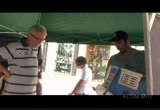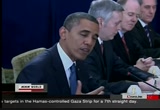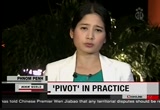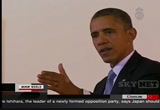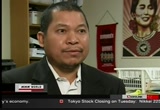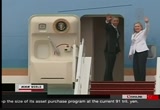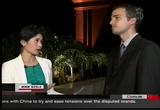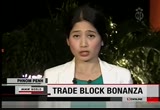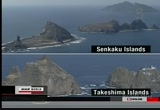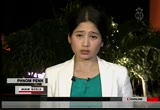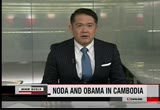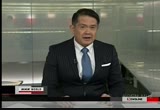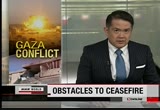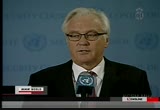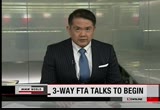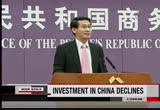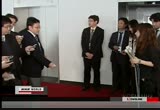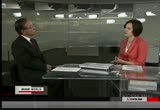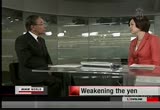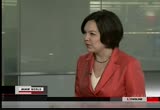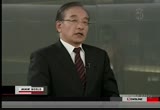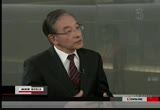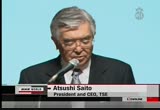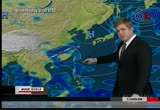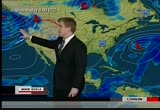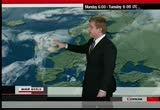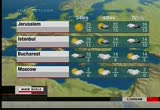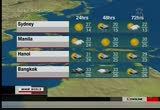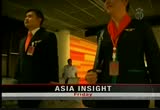tv Newsline 30min KCSMMHZ November 20, 2012 6:00am-6:30am PST
6:00 am
welcome to nhk world "newsline." the united states and china have joined the final day of asean leaders meetings in cambodia. the two most powerful nations are competing for influence in the asia-pacific region. discussions on economic and security policies were expected to be intense. patchari raksawong reports from phnom penh. patchari? the east asia summit was the big final meeting of the series of asean summits. the focus was how to deal with maritime disputes in the south
6:01 am
china sea. the united states called on the parties to sign up to a legally binding code of conduct, or coc. china said the disputes should not be internationalized, an indirect reference to the united states. u.s. president barack obama and chinese premier wen jiabao held bilateral talks before the summit began on tuesday. they both seek closer ties with southeast asian countries as part of their competing regional strategies. >> it's important that our two countries cooperate to build a more secure and prosperous future for the asia-pacific region and for the world. >> despite their friendly words,
6:02 am
both sides took their differences with them to the east asia summit. obama called on the country's concern to quickly draw up the code of conduct. one indirectly said the united states should not be involved, stating that the disputes should not be internationalized. now, obama's trip to asia is a sign that america's so-called pivot to asia strategy remains unchanged after his re-election. his visit to myanmar was criticized by some observers. they say it was premature. obama went ahead anyway, a signal of his desire to increase u.s. influence in southeast asia and keep china's ambitions in check. nhk world's matthew field reports. >> reporter: obama's visit to myanmar was the first to the country by a sitting u.s. president. people waving american flags lined the streets of yangon to welcome him.
6:03 am
the trip was full of symbolism. obama met opposition party leader aung san suu kyi at the home where she spent years under house arrest a. obama praised aung san suu kyi's achievements and her efforts toward democracy. he promised that the u.s. would continue to support myanmar. and he gave a lecture at yangon university, a former stronghold of pro-democracy activists. he used the occasion to pressure the government to continue on the path of reform. >> and we recognize no two nations achieve these rights in exactly the same way, but there is no question that your count will be stronger if it draws on the strength of all of its people. that's what allows nations to succeed. >> why democracy and why we need reconciliation? this is the main important thing.
6:04 am
>> i think this is very impressive, and i think his visit would lead a positive change. >> reporter: some observers criticized the visit. they said it was too soon to reward myanmar's leaders with a visit from the president of the united states. >> i don't think this is the right time for the president of the united states to visit burma. i don't think the president does enough to accept the highest level from the united states government. >> reporter: the u.s. administration decided to proceed with the trip despite those concerns. not only to promote the cause of reform in myanmar but also for strategic reasons. china created deep ties with myanmar while the country was isolated under its former military government. the obama administration believes encouraging democratization in myanmar will
6:05 am
keep china in check and create opportunities for u.s. businesses. >> robust u.s. trade and investment in asia will continue to be critical for our economic recovery and for our long-term economic strength. we decide to engage more deeply than international regional organizations to advance our interests. >> reporter: obama's visit to myanmar has served several purposes. one of them was ideological -- to further the cause of democracy. but it also may lead to strategic and economic benefits for united states. >> and matthew fie joins us now. matthew, president obama chose southeast asia for his first overseas trip since his re-election. what has this visit achieved? >> in his first term, obama announced his foreign policy would focus on the asia-pacific region. coming here has demonstrated to asian leaders that the pivot to asia policy will continue in his second term. southeast asia is strategically important, located between china
6:06 am
and india, and along the route of important sea lanes that power the world economy. it's also a growing market with a population of more than 500 million people. china has been trying to increase its political and economic influence in the region. the united states has to compete with that. by coming to southeast asia with this historic visit to myanmar and a presence here at the east asia summit, obama hopes to advance that agenda. >> now, what role did the u.s. play in the south china sea issue? and what is its agenda there? >> right. the philippines and vietnam are two asean countries in direct confrontation with china over the south china sea. they want legally binding rules to resolve the disputes. in the summit meeting, obama sided with them by calling for the quick creation of a code of conduct. but china remains cautious about that. asean nations need to work together for the sake of their economic goals. they also need peacef fuful relations with china, which, after all, is is the world's
6:07 am
second largest economy. balancing that with their competing territorial claims is the big challenge for asean. obama is arguing that with support from the united states they could help achieve that balance. going forward, the u.s. will likely strengthen its partnership with asean to try and counter the rise of china. >> thank you very much, indeed. that was nhk world's matthew field. now, competition between the u.s. and china isn't limited to political issues. they're both hoping to profit from the region's booming economic growth. nhk world's hiroki yajima has more. >> reporter: leaders of the ten asean nations and six other countries have agreed to start talks on the huge economic treaty to be known as a comprehensive partnership. there are 16 countries, including india, china, south korea, and japan aiming to lower
6:08 am
barriers to trade and services by the end of 2015. the economic bloc compromiises f the world's population and generates one-third of gdp. the same day of meetings had another major deal. trade ministers of japan, china, and south korea agreed to start negotiations for a trilateral free-trade agreement. ties between the neighbors have soured over various territorial disputes. but ministers of the nations managed to put their economies ahead of politics. one reason why china may be more open to partnerships in asia could be a certain level of anxiety over the increasing u.s. presence in the region. u.s. president obama had just met with the leaders of six countries include mag lay sha
6:09 am
and singapore. they' peer to have agreed to speed up negotiations for the trans-pacific partnership. amid growing global uncertainties, asian markets are being looked on as economic advantages with great potential. they are striving for regional influence. hiroki yajima, nhk world, phnom penh. >> competition between the united states and china for influence in southeast asia is intensifying, so it's even more important that flashpoint issues such as maritime disputes are resolved peacefully. asean nations have an ambitious plan to integrate their economy. they need to remain united in the face of outside pressures in order to achieve that goal. in 2013, the u.s. secretary of state and chinese foreign minister have both visited the
6:10 am
country in recent months. it seems that strategic diplomacy for next year's summit is already under way. that's going to wrap up our special coverage of the asean meetings. i'm patchari raksawong reporting from phnom penh. >> patchari, thanks. japanese prime minister yoshihiko noda spoke with president obama about an ongoing dispute with china. noda briefed obama on the issues surrounding the senkaku islands in the east china sea. japan controls the uninhabited territory. china and taiwan claim it. the prime minister said he will deal with china calmly and continue bilateral discussions aimed at easing tensions and strengthening ties. noda stressed the value of ja n japan/u.s. relations. >> translator: we welcome the fact that the u.s. is shifting its strategic focus to the asia-pacific region. east asia's security environment is getting comp collated, so i believe our alliance the really
6:11 am
important. >> that alliance between the united states and japan has been a cornerstone of prosperity and security in the region. and we are going to have the opportunity to further discuss steps we're taking to renew that vision and that alliance for the 21st century. >> noda and obama also spoke about the trans-pacific partnership. the prime minister emphasized his determination to speed up talks to bring japan closer to joining the free-trade agreement. the former tokyo governor says japan needs to look at the possibility of acquiring nuclear arms. the outspoken politician made the remark while preparing for a snap election next month. 80-year-old shintaro ishihara now leads an opposition group. he talked to foreign correspondents in tokyo. >> translator: it would be good to conduct a simulation on japan holding nuclear weapons because they can act as a deterrent. the decision of acquiring them or not can be decided later. >> ishihara surprised the public
6:12 am
in april by announcing that the tokyo government would buy the privately owned senkaku islands in the east china sea. ishihara's remark led to their nationalization. the purchase has caused the current state of strained relations between china and japan. another diplomatic heavy hitter is getting directly involved in the effort to secure a cease-fire in gaza. u.s. secretary of state hillary clinton to visiting the middle east to hold talks with regional leaders. israeli forces have been bombing the hamas-controlled gaza strip for severn days now. the palestinian group has retaliated with rockets. israel's targets have included a hamas-affiliated bank in gaza. palestinian fighters have fired up to 300 rockets a day at israel over the past week. the number released tuesday is lower. the conflict has killed 111 palestinians and three israelis. egypt has been mediating cease-fire talks between hamas
6:13 am
and israel. israeli negotiators have set a condition that hamas stop firing rockets in the long term. hamas representatives want israel to end its economic blockade of gaza. the u.n. security council has still not agreed on a statement proposed by the arab league calling on both sides for an immediate cease-fire. u.s. ambassador susan rice spoke after a closed-door meeting, saying the security council must not do anything that could undermine egypt's mediation efforts. russian ambassador vitaly churkin offered a veiled criticism of the united states. >> some members -- one member of the security council, i'm sure you can guess which, indicated sort of quite transparently that they will not be prepared to go along with any reaction of the security council. >> u.n. secretary-general ban ki-moon spoke after meeting in cairo with his counterpart on the arab league, nabil al arabi. >> my message is clear -- both
6:14 am
sides must halt firing immediately. further escalating the situation will put the entire region at risk. >> ban will again call for a cease-fire when he visits israel. three major countries in asia -- japan, china, and south korea -- have agreed to start talks for a free-trade agreement. they're putting aside territorial disputes between japan and the two ore nations. japan's trade minister, yukio edano, china's commerce incity, chen deming, and bark tae-ho met in phnom penh tuesday on the sidelines of the east asia summit. they said further economic development in east asia will benefit the three countries amid the european credit crisis that's overshadowing the world
6:15 am
economic outlook. china and south korea have already started their bilateral free trade talks. >> translator: japan has several pending issues with china and south korea. but we have been able to move on with the things we need to press forward. >> many japanese companies are staying away from china because of the bilateral territorial dispute. their investment showed a sharp drop in october. a spokesman for china's commerce ministry said japan's investment plunged 32.5% last month from a year earlier to $460 million. total foreign direct investment came to $8.3 billion, down 0.2%. that marked a fifth straight month of decline. observers say rising labor costs in china and the global economic slowdown are responsible for the decline. japan's central bank has decided to keep its monetary policy unchanged.
6:16 am
policymakers want to assess the impact of easing measures adopted in the last two months. bank of japan policymakers made the decision unanimously in a two-day policy meeting. they released a statement that said japan's economy has been weakening somewhat. the global economic slowdown and worsening relations with china have driven down domestic production and exports, and japanese manufacturers have to reduce capital investments. bank officials expect japan's economy to remain relatively weak for the time being. economic and fiscal policy minister seiji maehara attended the policy board meeting. he gave credit to the boj for its decision to ease credit for two straight months in september and october, but he urged more action. >> translator: i understand that today's decision means they want to wait and see whether their past measures will prove effective. the nation's economy is still weak, and the global situation
6:17 am
is uncertain, too. i hope the boj will carry out powerful monetary policy to achieve its goal of 1% inflation soon. earlier, we spoke about the boj decision and the outlook for japan's monetary policy. he is a former member of the boj's policy board. >> so, thank you for being here. what is your take on the boj decision? >> well, i did not expect any new move this time. as you have just said, the bank eased policy twice in a row the last two months. not many boj watchers expected anything this time. >> and what about the outlook? what do you expect? >> well, i think the bank of japan will have to continue strengthening monetary easing measures. as long as the inflation goal is
6:18 am
not expected to be achieved. >> and what would be the impact of that on the markets? >> well, you know, the monetary easing is to be conducted in order to put downward pressure on long-term interest rates. but a hidden -- an important hidden objective of easing is to prevent the yen from strengthening. so the impact on the economy will depend in part on its impact on the yen exchange rate. recently, central banks in advanced countries are competing with each other to weaken their currencies. >> well, let's shift our focus, then, to the political and if fiscal and monetary relationship. there's ban lot of focus ever since the prime minister dissolved the lower house, called for a general election next month. politicians are becoming increasingly vocal. take, for example, shinzo abe, who is the president of the liberal democratic party. he is suggesting that several
6:19 am
unorthodox measures be taken by the boj, including the direct underwriting of jgbs, as you can see on the screen. he says, we, the government, would conduct necessary public investment, possibly have the boj buy all construction bonds. now, in response, the prime minister of japan, yoshihiko noda, he's conservative. he emphasizes fiscal discipline as it is also seen on the screen, and as well the independence of the central bank. so mr. taya, as a former policy board member, what is your take on these debates, and -- what is your take on these debates? >> well, actually, the new government which is going to be formed next month is not likely to force the bank of japan to underwrite newly issued government bonds, which is prohibited by the fiscal. i think any amendment to one of the most fundamental laws like
6:20 am
fiscal law is not likely to be changed easily. so i do not expect the bank -- i mean the government is going to force the bank to comply with the pressure. >> mm-hmm. >> from political circle. >> mm-hmm. and what is your take on some of these unorthodox monetary measures suggested by mr. abe? and, you know, what is your -- what do you think is the role of the central bank here in japan? >> well, actually, mr. abe is advocating a very aggressive easing measures, including a reduction of interest rate on boj current account deposits from 0.1% to 0% or a sub-zero level while conducting unlimited easing. i don't think -- there's two things. in other words -- i mean, unlimited easinging and the reduction of interest rate on
6:21 am
the boj current account deposits to a subzero level. it's not easy to imagine that these two are compatible. and if the bank of japan tries to reduce this interest rate to a subzero level, then the bank is not likely to be able to supply a large amount of central bank credit. >> that was teizo taya, professor at mikio university. japan's two major stock exchanges have obtained shareholder approval for a proposed tie-up. shareholders of the tokyo stock exchange and the osaka securities exchange endorsed the plan at extraordinary meetings on tuesday. the two bowerss will be integrated into a new holding company next year. the tie-up is aimed at
6:22 am
attracting funds from both japanese and foreign investors by listing more companies and revitalizing the market. the tokyo stock exchange used to be one of the world's largest stock markets both in terms of market value and trading volume. but trading dwindled after japan's bubble economy collapsed in the early 1990s. the total market value of companies listed on the two was the world's fourth largest as of the end of last month. >> translator: we have passed one milestone, and it's just that -- one milestone. we have yet to promote system integration and take other steps to make things more convenient for market participants. it's snowing in northern japan, but that's supposed to ease. meteorologist robert speta has more. robert? >> well, across much of northern honshu and hokkaido to be exact, here, you haven't seen that snow. even in the next 24 hour, actually going into your
6:23 am
wednesday, you still could be seeing more snow, up to about 37 centimeters in the higher elevation, but that is going to dramatically change going into western afternoon. we have this high pressure come in from the west. that's going to start to change the wind direction across much of northern japan. that wind will come in. this will wind down bringing much fairer weather with it across most of. opinion here. meanwhile, behind it, here, we have another frontal area that will start to develop across portions of southeastern china. expect this to pull towards the east and on friday much of the pacific side of japan, you're going to be seeing heavy rain showers here as this storm system continues to push off. meanwhile, into mongolia, another storm system is pulling down from the north. this one won't bring potent weather impact as far as rain and snow, but the temperatures will be coming down. in ulan bator, minus 20 is going to be your low going into your thursday, at least for your high on your wednesday, minus 9. but this is going to be exceptionally cold off there towards the north.
6:24 am
beijing getting up to 9 on wednesday. in the tropics, 30s across here, actually into the philippines, mindanao, you're seeing tropical weather as far as convective thunderstorm activity here. some very heavy rain showers in the past 24 hours, seen about 120 millimeters of rain. there still is the threat of flooding and landslides with that. definitely still want to watch out there. meanwhile, to the america, also seeing a very potent storm system to the pacific northwest. it's a very big travel weekend out across much of this area, thanksgiving on thursday here in the united states. but this is going to be causing all sorts of mess. you are seeing some winds coming onshore about 80 to 90 kilometers per hour accompanied by heavy rain, 50 to 150 millimeters of rain. localized areas could see 250 millimeters. flashflooding is a risk. farther inland, snowfall, blizzard warnings in effect across portions of montana as that snow accompanied by the gusty winds really reducing visibilities and whiteout conditions across these areas. if you're flying in and out of
6:25 am
the pacific northwest, british columbia, check in on your flights ahead of time. they could be delayed ar canceled throughout the coming days. towards the east, much fairer weather. thursday going into friday, the midwest, you'll have to watch out for a frontal area. for the most part in the next several days things remain on the dry side. temperatures in the teens in chicago with a high of 13, denver 18 for your high. winnipeg, only getting up to 30, just above freezing on your tuesday. now over towards europe, across much of the northwest, from the scandinavian peninsula into the british isles, one storm after another has been impacting the area, actually into the uk. you saw about 67-kilometer-per-hour winds here today, and it does look like this is going to continue to impact the region. that same weather pattern, mainly because this high pressure over central and eastern europe. that is just remaining in place, keeping those storms off towards the north. also another storm system here across italy over towards greece has already been bringing some severe weather. still some gusty winds, strong
6:26 am
thunderstorms could be popping out of this system. the good news is that going through wednesday, expect this to start to wind down and really improving conditions across this area, even extending to the western portions of turkey. temperatures will remain in the single digits across much of europe, moscow only 2 for your high. london and paris, both at a pair of 11s in the middle of your week. now here's a look at your extended forecast. ♪
6:27 am
145 Views
IN COLLECTIONS
KCSMMHZ Television Archive
Television Archive  Television Archive News Search Service
Television Archive News Search Service 
Uploaded by TV Archive on

 Live Music Archive
Live Music Archive Librivox Free Audio
Librivox Free Audio Metropolitan Museum
Metropolitan Museum Cleveland Museum of Art
Cleveland Museum of Art Internet Arcade
Internet Arcade Console Living Room
Console Living Room Books to Borrow
Books to Borrow Open Library
Open Library TV News
TV News Understanding 9/11
Understanding 9/11